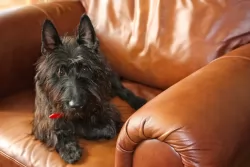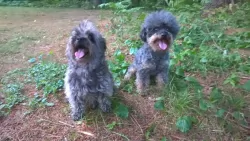 MyDogBreeds
MyDogBreeds Dutch Shepherd is originated from Netherlands but Cairland Terrier is originated from United Kingdom. Dutch Shepherd may grow 29 cm / 12 inches higher than Cairland Terrier. Dutch Shepherd may weigh 24 kg / 53 pounds more than Cairland Terrier. Both Dutch Shepherd and Cairland Terrier has almost same life span. Both Dutch Shepherd and Cairland Terrier has same litter size. Dutch Shepherd requires Moderate maintenance. But Cairland Terrier requires Low maintenance
Dutch Shepherd is originated from Netherlands but Cairland Terrier is originated from United Kingdom. Dutch Shepherd may grow 29 cm / 12 inches higher than Cairland Terrier. Dutch Shepherd may weigh 24 kg / 53 pounds more than Cairland Terrier. Both Dutch Shepherd and Cairland Terrier has almost same life span. Both Dutch Shepherd and Cairland Terrier has same litter size. Dutch Shepherd requires Moderate maintenance. But Cairland Terrier requires Low maintenance
 The Dutch Shepherd is of Dutch origin, hailing from the Netherlands. They were originally used as herding dogs on the farms, where they became a jack-of-all-trades type of dog.
The Dutch Shepherd is of Dutch origin, hailing from the Netherlands. They were originally used as herding dogs on the farms, where they became a jack-of-all-trades type of dog.
The Dutch Shepherd in those days, 100 odd years ago, were also known as Hollandse Herders.
These dogs are more rare in modern days, but when you do find them, they are being used as police or security dogs, as guides for the blind, or simply as family friends.
 The Cairland Terrier is a cross between the Cairn Terrier and the West Highland White Terrier. It simply means that if you own a Cairland, you’re going to get a little bit of each dog in him.
The Cairland Terrier is a cross between the Cairn Terrier and the West Highland White Terrier. It simply means that if you own a Cairland, you’re going to get a little bit of each dog in him.
This hybrid is a new breed which means you’re not going to get too much documented history on the dog. A tough little hunter of fox and otter, the Cairnland is thought to hail from Scotland.
 The Dutch Shepherd dog is very similar in appearance to the popular German Shepherds, being a medium to large sized dog.
The Dutch Shepherd dog is very similar in appearance to the popular German Shepherds, being a medium to large sized dog.
The males are slightly heavier than females, but both males and females can stand between 55 and 62cm and weigh between 20 and 32kg.
There are actually 3 varieties found in the Dutch Shepherd dogs - short-haired, long-haired, and wiry or rough-haired. The dog has a double coat, consisting of a woolly undercoat and a top coat. The basic color of the coat is gold or silver through to red, giving rise to the brindle variations. Too much black or white seen in the fur is considered a fault.
In 1914 it was decided that brindle coats would distinguish them from the others.
The eyes of the Dutch Shepherd are dark, almond shaped and slightly slanting, while the medium sized ears are erect and high on the head and the thick tail is slightly curved. The dog has an unusually long tongue which is often found hanging out.
Early training and socializing for this dog is important so that he can learn to stay calm around new people, or visitors to the property.
The beautiful Dutch Shepherd doesn’t like being left alone for too long, loving rather to be involved with all that the family is involved in. They get on well with other pets in the home as well as being child-friendly.
They are happy dogs, who can also be smart and cunning, therefore highly trainable. They soak up new commands easily. Dutch Shepherds are also good watchdogs as they are fiercely loyal, and do not take kindly to strangers.
 The Cairland Terrier is a small dog standing anything between 20 and 35cm in height and weighing in at roughly 4 to 10kg. He has short legs, a compact little body, while being muscled and strong. He has small erect ears with a shortish upright tail.
The Cairland Terrier is a small dog standing anything between 20 and 35cm in height and weighing in at roughly 4 to 10kg. He has short legs, a compact little body, while being muscled and strong. He has small erect ears with a shortish upright tail.
The color of the medium length coat can be fairly varied which means brown, black, cream, fawn, brindle or even white from the Westie. The dog has two coats with the topcoat being fairly harsh, coarse and straight to slightly wavy while the undercoat is soft.
When it comes to temperament, the Cairland Terrier is social and feisty with a high self-esteem. He has a strong personality and can be somewhat stubborn but he is a great friend of children in the home. He just loves to take part in all their games.
With training and socialization which he undergoes easily, he will get on well with other pets too, although he can become aggressive with other dogs in his territory.
 Your alert, intelligent and somewhat rare Dutch Shepherd is a loyal, protective dog, and while he can be aggressive around intruders and be a great guard dog, he can also be a gentle, loving animal around his human family members.
Your alert, intelligent and somewhat rare Dutch Shepherd is a loyal, protective dog, and while he can be aggressive around intruders and be a great guard dog, he can also be a gentle, loving animal around his human family members.
Though his tongue is long and often hangs out, you won’t have to contend with drooling. He is a wonderfully active dog and doesn’t easily gain weight. He isn’t a barker or howler, and his exceptional intelligence makes him highly trainable.
Whether there are children or other animals in the house, you can rely on your Dutch Shepherd to get on well with them, making him a wonderful family pet and canine friend.
 Terriers are dogs that are full of character and self-confidence, and your Cairland Terrier is no different. These small dogs in the Terrier group don’t actively look for a fight with other dogs, but if they are provoked, they aren’t intimidated and will give bigger dogs a piece of their mind. They make splendid pets and will always be ready for a game.
Terriers are dogs that are full of character and self-confidence, and your Cairland Terrier is no different. These small dogs in the Terrier group don’t actively look for a fight with other dogs, but if they are provoked, they aren’t intimidated and will give bigger dogs a piece of their mind. They make splendid pets and will always be ready for a game.
Make sure that your Cairland Terrier remains the feisty little character he is by making sure he gets well looked after. Dogs aren’t known as man’s best friend for nothing, and in exchange for the care you give your Terrier, you’ll be rewarded by a loyal and devoted friend.
 The Dutch Shepherd dogs are the healthiest of the Shepherd breeds. They have relatively few health problems.
The Dutch Shepherd dogs are the healthiest of the Shepherd breeds. They have relatively few health problems.
However, like the German Shepherds they may develop hip dysplasia, but this is in fact fairly rare. Get your pet to the vet if you suspect this in your dog because it can lead to lameness.
In 2018 the University of Minnesota identified a disease in Dutch Shepherds called Miositis. This is an inflammatory myopathy causing painful inflammation of the skeletal muscle tissue.
 Your Cairland is a tough, feisty little dog and you’re not going to find yourself constantly having to take him to the vet. However even healthy dogs can be affected by ill health, and we look at a couple of illness you want to watch for with your Terrier.
Your Cairland is a tough, feisty little dog and you’re not going to find yourself constantly having to take him to the vet. However even healthy dogs can be affected by ill health, and we look at a couple of illness you want to watch for with your Terrier.
This can be brought on by a change in diet. Usually you can keep food away from your pet for 24 hours, allowing the stomach to empty and to settle. However, if there is blood in the diarrhoea or your dog is vomiting, then veterinary advice must be sought.
Just like humans, a dog can have an allergy to pollen where you see watering of the eyes as well as sneezing. This is because of inflammation of the mucous membranes in the nose. Your vet can ease the problem for your pet.
 Unfortunately Dutch Shepherds shed quite a bit of hair during their shedding period in spring and autumn. This makes regular brushing important during these seasons so as to remove the dead hairs, especially from the undercoat.
Unfortunately Dutch Shepherds shed quite a bit of hair during their shedding period in spring and autumn. This makes regular brushing important during these seasons so as to remove the dead hairs, especially from the undercoat.
The wire- or rough-haired variety shouldn’t be brushed but should rather be groomed by a professional groomer every 6 months or so.
Their nails need to be trimmed when necessary, to avoid cracking, splitting, or an injury.
Their ears can be cleaned weekly to get rid of any debris or wax build-up. This, if left, can lead to infection. Brush his teeth 2 or 3 times a week to avoid dental disease which brings on a host of illnesses.
These dogs do need regular exercising, and at the same time need to be physically and mentally stimulated. He is the kind of dog that has been used for herding purpose on the farm and he just craves activity. Take him with you on your walks and include him in ball games, hikes, jogging, swimming or when you go cycling – he is game for all kinds of activities.
The formula for their diet would be that of a medium to large dog with high energy levels. The top commercially manufactured foods have been developed to include all the important vitamins and minerals. Fish oil can also be added to their food to keep the coat shiny.
Add in cooked rice, cooked vegetables and chicken from time to time and be sure to add in some raw meat occasionally to prevent problems with the skin. Always ensure that your pet has fresh, cool water to drink.
 Because the Cairland Terrier is a hybrid breed, the coat can be wiry or soft, but it’s a low maintenance coat. He will need to be brushed twice a week. Some people take their Cairland to have the coat professionally trimmed while others buy a special stripping tool and they strip the hair a couple of times a year.
Because the Cairland Terrier is a hybrid breed, the coat can be wiry or soft, but it’s a low maintenance coat. He will need to be brushed twice a week. Some people take their Cairland to have the coat professionally trimmed while others buy a special stripping tool and they strip the hair a couple of times a year.
Small dogs are prone to dental disease, so you will need to brush your Cairland’s teeth at least two or three times a week. Dental disease is a serious problem with dogs and it won’t only affect the teeth and gums but it can result in infection which can contribute to organ failure. Periodontal disease is always a big problem with little dogs. If you’re not sure how to go about looking after your dog’s teeth, you can always take your dog to the vet for dental check-ups and cleaning.